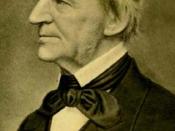In his Self-Reliance essay, Ralph Waldo Emerson wrote, ÃÂNothing is at last sacred but the integrity of your own mindÃÂ. This quote shows that the only thing that keeps a man from reaching his potential is the strength of his mind. Emerson believes that to find integrity is the absolute goal of human existence. The dictionary gives this definition of integrity, ÃÂIntegrity: Something undivided; an integral whole. The condition of having no part or element taken away; soundnessÃÂ Self-integrity, in this sense, is being in possession of ones own undivided body, mind, and emotions. Emerson believed that the feeble minded were destined to suffer unless they could train their mind to become one. Human beings have minds that are separated from its companion, emotion, an abstract element. However the actual body is concrete and is used in terms of non-thinking or non-feeling of the human mind. To Emerson, finding the integrity of oneÃÂs own mind can be a life long journey that can only be discovered through truthfully searching within one's self.
Emerson also could have meant to alter the meaning of sacredness, which is only in the integrity of oneÃÂs own mind. Emerson believed that churches and other organizations were labeled as ÃÂdead institutionsÃÂ and thus to deny the concept of sacredness is to condemn all organized religions. No religion can exist without some form of ÃÂsacrednessÃÂ. Emerson designated that something ÃÂsacredÃÂ or ÃÂholyÃÂ is to deprive people of their right to experience each thing for what it is, to appreciate its full value, and not for what it is said to be. When nothing is at last sacred but the integrity of your own mind, all values, principles, and morals strip down to oneÃÂs very inner core and then will have themselves to blame or praise.


